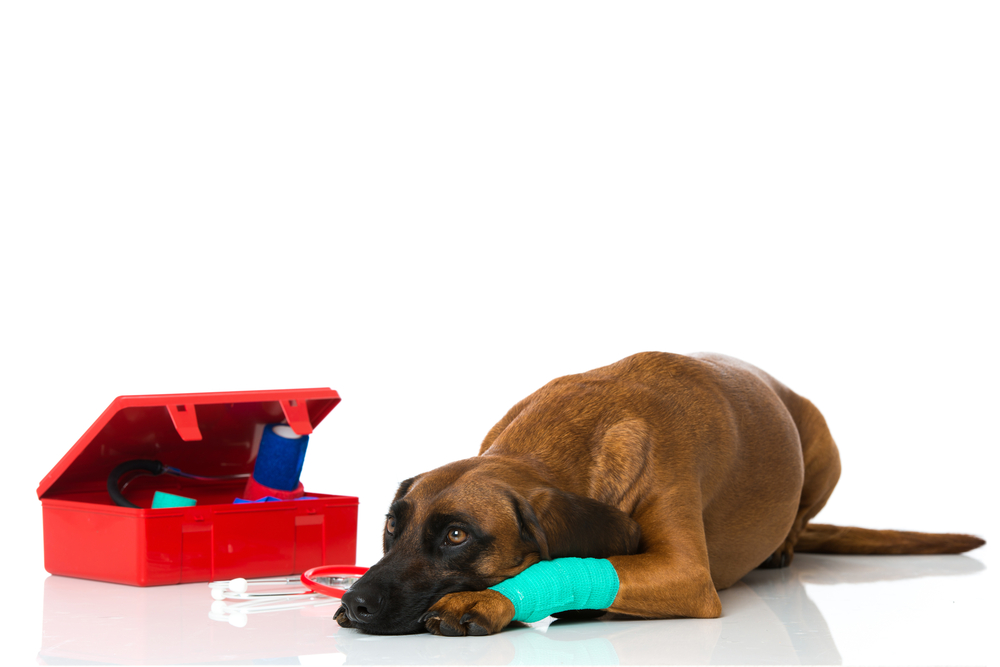We all know that the unexpected can happen at any time, no matter how much we try to prevent it. However, that does not mean we should give up trying to prevent what we can. While there is no sure fire way to prevent a disease or injury from happening to your best friend, there are some things you can do to sweeten the odds. When it comes to expensive vet bills, Trupanion data puts these as the top five $1,000+ vet bills:
1. Rupture of ACL. Dogs, like humans, rupture their ACL’s while doing sports such as agility, flyball, herding, lure coursing, etc. Prevention includes making sure your dog is in the best physical shape possible – running an out of shape dog is a recipe for disaster. Your dog should also be stretched before and after any physical activity. Bobbie Lyons, Cert CF, has online classes that can teach your how to condition your canine athlete – whether they are a world class agility dog or just a weekend running partner.

2. Gastroenteritis. Caused by several things including metabolic disorders, eating garbage or feces, inflammatory bowel disease, parasites, bacteria, viruses, or even allergies, gastroenteritis is best prevented by watching your dog’s diet, making sure she is getting the right balance of nutrients, and keeping her free of parasites by using monthly preventatives provided by your vet (http://www.pethealthnetwork.com/dog-health/gastroenteritis-dogs).
3. Ingestion of Foreign Material. Almost every dog owner has experienced the awful feeling of coming home to a sick dog and having no idea what was wrong (though sometimes there is evidence to suggest). You rush them to the vet and x-rays reveal something blocking their system – rocks, socks, bedding, ribbon, etc. These vet bills can be extremely costly, though preventing them is simple. If you have a dog you know eats things, keep him contained when you are not able to watch him. Do not leave him with anything he could ingest that is not edible.
4. Pancreatitis. Of the five, this one is probably the hardest to prevent. The sudden onset of inflammation and swelling of the pancreas is not entire understood by vets. However, it has been found to be most prevalent in overweight spayed females, dog on high-fat diets, and those being given too many fatty table scraps. So keep your pet at a healthy weight and watch the amount of fat they intake. (http://pets.webmd.com/dogs/dog-pancreatitis-symptoms-and-treatment)

5. Luxating Patella. This is a tricky one, because mostly MPL is genetic. This is why it is important to research your breed and where your puppy is coming from. Responsible breeders have their dogs joints checked and know whether MPL is in their line. If it is present, or if the breeder doesn’t know, don’t buy a puppy from them. It is most common in small breeds. Remember, extra weight puts strain on the joints, keeping your dog at a healthy weight will help lessen the effects. Strengthening exercises can also help.
These conditions are hard to predict and have a huge impact on your wallet. In order to prevent and be prepared for these conditions, it is important to maintain your pet’s healthy lifestyle by following these tips from Dr. Denise Petryk, DVM, Trupanion’s Director of Veterinary Services:
- Find a veterinarian that you like and establish a relationship.
- Exercise your pet regularly. Work to keep them fit, lean and happy.
- If you have any doubt about your pet’s behavior, take them to the vet. You know best when your pet isn’t acting normal, and catching issues early can be the best and least expensive way to get your pet better.
- Provide your pet with high quality food and treats. Talk to your veterinarian about customized food and treat advice that is best for your pet.
- Take your pet in for an annual physical exam and dental check-up. Stay on track with preventative vaccinations as recommended by your veterinarian.
- Become familiar with your local Veterinary ER and specialty hospital and other resources like www.VeterinaryPartner.com in case of an emergency.
- Be prepared to provide pet first aid. The AVMA provides great pet first aid tips here.
- Make sure your pet has medical insurance coverage. While it is impossible to predict when and if these vet bills will impact your companion, having medical coverage for your pet allows you to avoid financial stress if something were to happen.
Click to the next page to see an informative infographic concerning The Most Common and Expensive Pet Illnesses For Cats & Dogs from PetFirst Pet Insurance!
Infographic from PetFirst Pet Insurance.

 Toledo, United States.
Toledo, United States.